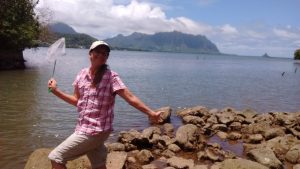Name: Sara McBride
Hometown: San Diego, CA
Lab: Molecular and Systems Physiology Laboratory of Janelle Ayres
Lab websites: https://www.salk.edu/scientist/janelle-ayres/
Hobbies: Writing Historical Fiction, Travel
What do you study? We study why some people survive a disease, like influenza or sepsis, and why others get very ill or die. We study the metabolic pathways, the microbiota, and other aspects of health that might be used to predict why a person survives or dies.
Why is it important? If we can figure out why a person might survive or die from a disease, then we can develop drugs that help trigger metabolic pathways that lead to survival. This is particularly important for pandemic respiratory viruses like SARS-CoV-2 which leads to COVID-19. Why are some people asymptomatic with no symptoms and other people die?
How did you become interested in science? I used to work in Hollywood and I did the film rights agreement for the life story of Joann Burkholder a scientist who discovered a toxic dinoflagellate (Pfiesteria piscicida) that produces an aerosolized neurotoxin on the water’s surface which induces Alzheimer’s-like symptoms and memory loss. Government officials in North Carolina tried to destroy her scientific reputation so they could keep beaches and lakes open during the tourist season. Her studies helped in improving legislation to control pollution. The story really made me value science for the good of public health. It’s a great book: The Cell From Hell.
What do you like about being a scientist? Anyone who becomes a scientist, and stays in academia, does it because they want to make the world a better place. Everyone I work with is a good person. I can’t say the same thing for my first two careers in Hollywood and New York City Architecture. However, my first two careers paid much better.
What are 5 general vocabulary terms someone should know going into your field of science?
Microbiota, disease tolerance, infection, virus, bacteria
What are 5 specific vocabulary terms someone should know about your research?
Metabolism, commensal colonization, attenuated bacteria, glycolysis, lipolysis

